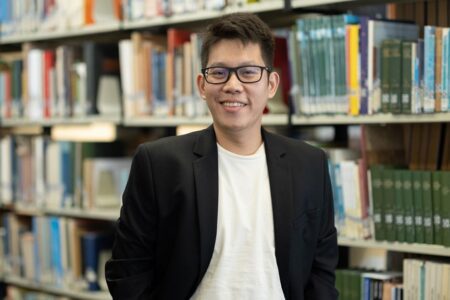
Stepping into parliament meant that Era Zakaria is a couple of steps closer to her dream of being a part of the political world. But in the eyes of some of her male friends on Instagram, her stepping into parliament probably meant she was on a field trip of sorts.
“I uploaded a photo of me at the Malaysian parliament and uploaded it onto social media, and for some reason, the majority of the comments were of men asking me what I was doing in parliament and asking if I was there for a tour,” she recalls.
It struck a chord in Zakaria — if she’s going to work for parliament or to become a diplomat, this will be the sexism that she’ll be facing throughout her career.
She knew that her male peers would probably never be discriminated against. But that begged the question, why can’t others believe that she earned her spot, and for them not to use her gender to discredit her achievements? Also, has her degree in global and gender studies prepared her for what’s to come?
As insulting as the comments were, Zakaria refused to let them take her down, and thanks to her love for her country, it motivated her even more.

Zakaria recently completed her internship as an Attachment Officer at the ASEAN Inter-Parliamentary Assembly (AIPA) Secretariat. Source: Era Zakaria
Her love for her own country trumps it all
Zakaria was born in the Republic of Fiji to a West Malaysian father and a Sarawakian mother, and has lived abroad for most of her life.
Her father works as a diplomat, and because of his job, she has lived in seven countries: Fiji, Finland, Malaysia, New York, Sri Lanka, Germany, and South Africa.
But despite living in some of the biggest global hubs in the world, something was calling her home to Malaysia.
“Growing up abroad, I was the minority, and sometimes I felt ashamed of being Malaysian because back then, no one really knew where Malaysia was,” says Zakaria. “But over time, I felt some sort of pride as Malaysia is progressing well, and even more so, I’m proud to be a Sarawakian.”
It was that pride that made her return home to pursue a Bachelor’s of Arts and Social Sciences double major in Global Studies and Gender Studies at Monash University Malaysia.
However, it wasn’t only the pride that drew her to the majors and home — it was the racism she faced while completing her International Baccalaureate (IB) in Germany.

Thanks to her academic journey, she is now well-equipped with a solid understanding of international relations and a passion for research in diplomacy, policy, international justice, and gender. Source: Era Zakaria
“I was studying in Germany during the pandemic, and Asians were facing a lot of racism in the country,” she says.
“But that got me curious about activism and how countries are run, and the more I delved into it, the more I decided to pursue a career in something that will make an impact — hence choosing global studies as my degree.”
Global studies was her initial major; however, after taking an elective in gender studies, she felt that it aligned with her interests and switched to a double major in gender studies.
After declaring both her global and gender studies majors, she participated in an exchange programme to study at the Australian campus, where she had the opportunity to learn more about how Australia is governed.
“Every country is run differently, and having lived in over seven countries, I had the opportunity to experience it in many different ways,” she says. “Looking at Malaysia, there are a couple of things that aren’t the best, especially in gender related policies and public transportation.”

Zakaria was also a Malaysian Government Scholar. Source: Era Zakaria
Zakaria understands that not everything that works abroad will work in Malaysia, but it’s still worth exploring and seeing what can be implemented to better her country.
After graduating, she scored an internship with the ASEAN Inter-Parliamentary Assembly (AIPA) Secretariat, a regional parliamentary body that acts as a primary point of communication between member countries, as an attachment officer.
While Zakaria may have faced difficulties and discrimination from peers outside of work, she loved everything she participated in at AIPA — and she has been working towards becoming a diplomat for Malaysia.
“Many might think that I’m becoming a diplomat because my dad is one, but that’s not the case,” she shares.
“I’m doing this of my own accord to make a difference in Malaysia and help build relationships with other countries. I also want to travel the world and have a stable job.”
Today, she’s studying to complete a language exam (Bahasa Malaysia) to become a Malaysian diplomat and looking for jobs that can help her gain experience in the field to prepare her for what’s to come.

Zakaria and a coworker during a meeting at the Malaysian Parliament. Source: Parliament Malaysia
An ultimate guide to becoming a diplomat
We all have dreams. We’ve probably dreamt of becoming actors, musicians, astronauts, or diplomats. And the best part about all these jobs is that they will allow you to travel the world.
But what must we do to achieve our dreams, especially to become diplomats?
Well, here are a couple of ways you can do just that.
Bachelor’s degree
There isn’t a specific degree that guarantees you a path to becoming a diplomat; however, pursuing a bachelor’s degree in international relations, political science, or public policy is recommended. You can even pursue global studies, just as Zakaria did.
Universities such as the London School of Economics and Political Science (LSE), Ohio State University, SciencePo, National University of Singapore (NUS), and Australian National University offer one of the best political science and international relations programmes in the world.
Master’s or a PhD degree
Getting a Master’s or PhD degree isn’t necessary, but it can help you dive deeper into specific fields you’d like to specialise in.
“It’s not 100% mandatory to get one, but it can be advantageous if you’re looking to join the UN or other NGOs, as they require having at least a master’s degree,” Zakaria shares. “Having one can even help you secure jobs in government organisations, as well as getting you higher pay.”
You can pursue a master’s degree in international relations, political science, law, economics, and other related fields.
Study abroad
Studying abroad is a must if you’re thinking about becoming a diplomat; it’s practically your first field assignment.
Being a diplomat means representing your country, navigating cultural nuances, and understanding global affairs — there’s no better way to prepare for that than by living in another country yourself. Besides, as Zakaria said, “No countries are alike, that means you can learn from them.”

Zakaria and her friends during her time abroad. Source: Era Zakaria
Learn new languages
As a diplomat, you’ll be working across borders, cultures, and time zones, and being able to speak the local language will be a bonus. It will help you build respect and trust and open doors that would otherwise stay closed.
Work experience
Diplomats are problem-solvers, peacekeepers, and bridge-builders, which is no easy task.
Internships, volunteer roles, or part-time jobs in governments, NGOs, or international organisations can help you build practical skills like negotiation, communication, problem-solving, and even crisis management — all of which are key to diplomacy.
Build your skills
Diplomats wear many hats: negotiator, advisor, peacekeeper, communicator, and cultural translator. To juggle all that, you’ll need to sharpen a wide range of skills. The more versatile you are, the better you’ll handle high-pressure situations.

Zakaria participating in an event as part of AIPA. Source: Era Zakaria
Advice for girls looking to pursue a career in global studies, diplomacy, or politics
Entering an industry that’s filled and often overpowered by men is incredibly daunting, but it does not mean that you should not pursue it.
For Zakaria, being headstrong is key.
“I met a female Malaysian minister when I was studying in Australia, and she told me that I have to be really headstrong if I were to work in the ministry,” she shares. “That I can’t care about what other people say about me.”
Another key thing to have is for your heart and mind to be there — you must want it and to stand up for yourself. Most importantly, never feel sorry as a woman in diplomacy or politics.
Hearing those words of advice gave Zakaria the confidence to keep going.
“I think people are too scared to pursue a career in it, or they may feel demotivated due to certain circumstances, and I understand that,” she says.
“Besides, not many people have the privilege to speak up. But if you’re really passionate about it, go for it. Don’t sweep it under the rug, because silence is complacency.”










